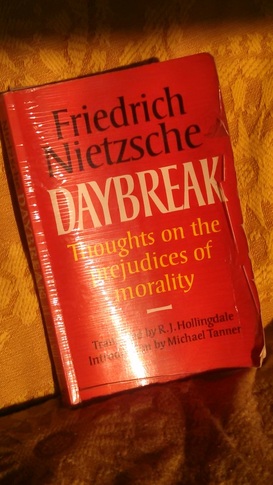 2020 Nietzsche Daybreak
2020 Nietzsche Daybreak Thirsty and hungry
Drives aren’t gendered; Nietzsche’s Daybreak was written more than 30 years before Freud and the id, ego, super-ego construct: here, drives are just drives.
Also, sentence 16 has a “him” and “his” changed to her and her:
14.
– Take some trifling experience.
15.
Suppose we were in the market place one day and we noticed someone laughing at us as we went by: this event will signify this or that to us according to whether this or that drive happens at that moment to be at its height in us – and it will be a quite different event according to the kind of person we are.
16.
One person will absorb it like a drop of rain, another will shake it from her like an insect, another will try to pick a quarrel, another will examine her clothing to see if there is anything about it that might give rise to laughter, another will be led to reflect on the nature of laughter as such, another will be glad to have involuntarily augmented the amount of cheerfulness and sunshine in the world – and in each case a drive has gratified itself, whether it be the drive to annoyance or to combativeness or to reflection or to benevolence.
17.
This drive seized the event as its prey: why precisely this one?
18.
Because, thirsty and hungry, it was lying in wait.
*Next Up: Tomorrow, 19 April, and the second part of 2020 Nietzsche Daybreak aphorism 119.
Posted by Bryan W. Brickner
 RSS Feed
RSS Feed
